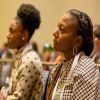2021 Annual Meeting
In This Section
Please sign in to view the articles. Once you've signed in please refresh the page to see the download link.
From October 28 - 30, 2021, hundreds of intellectual property practitioners from around the world converged on the Gaylord National Resort & Convention Center in National Harbor, MD for the first-ever hybrid AIPLA stated meeting, the 2021 Annual Meeting. Hundreds more attendees joined the event virtually, receiving the same learning and networking opportunities as their in-person counterparts. More than 60 unique speakers were hosted across 34 events and sessions, including hybrid networking events and interactive exhibitor experiences. The 2021 Annual Meeting reminded IP practitioners near and far that this event is indeed ‘Where the IP World Meets.’
To read an article, please click on the down arrow to the right of the article title.
 Introduction & President's Message - Patrick J. Coyne - Fall 2021
Introduction & President's Message - Patrick J. Coyne - Fall 2021
Who Really is AIPLA President Patrick J. Coyne?
By Dave Hill and Chris Foley
When we were asked to help introduce your new AIPLA President, Patrick Coyne, in this brief article, we thought we already knew him quite well. He has been a friend for forty years and our partner at the Finnegan firm for twenty. Yet, we learned a great deal more about him preparing this article. We want to share with you a more complete picture of this incredibly active and dedicated person we have all chosen to be our President. We knew he was a talented trial attorney with an amazing grasp of the law, and we knew that he had successfully represented a wide range of clients, large and small, in over 100 cases in state and federal trial and appellate courts during his 40 years of law practice. We knew that he had been active in several bar associations, serving on numerous committees, holding leadership positions, and had ascended the ladder of AIPLA to his present position as President.
Early Years:
Here are just a few of the more interesting things we learned that may help you to understand why Patrick is such a perfect person to lead our Association. He was born in Harrisburg, PA, and lived for a short time in Atlantic City, NJ before his family settled in northern Virginia, where he grew up. He was the oldest child in a family of five boys, the youngest being 10 years behind him. His dad studied journalism following a stint in the Navy, and eventually became a reporter for the Associated Press. Patrick attended parochial grammar school in Annandale, VA, and high school in Alexandria, VA, before transferring to and graduating from Annandale High School in Northern Virginia. After two years at Virginia Tech, he transferred to the University of Virginia, receiving a degree in Civil Engineering with high honors in 1978. He was admitted to the Tau Beta Pi Honor Society. He then joined PRC Corporation as an engineer, working primarily on alternative energy projects, until he began law school the next year back at the University of Virginia.
Chef Patrick:
Beginning at age fifteen, while in high school, Patrick began working at a local restaurant as a bus boy, later moving up to be a cook. (He also pumped gas for a time.) He continued working at the same restaurant in northern Virginia on weekends while at Virginia Tech. When he returned to Charlottesville to attend law school, a friend recruited him to cook at a local restaurant, The Virginian, where he was head cook on weekends for the next two years during law school. When he and his wife settled into a home on Capitol Hill years later, he and a neighbor formed a Men's Cooking Club, which is still going after 20 years!
Legal Career:
After his second year of law school, Patrick joined Finnegan as a summer associate. He continued on as a law clerk during his third year of law school, working on weekends in Finnegan's DC office. This job proved fortuitous, as he met his future wife, Nancy, on his first day as a summer associate. She was working at the Finnegan firm then, as an administrative assistant to Ford Farabow. After completing law school, Patrick took a position as a Technical Advisor to Circuit Judge Edward S. Smith at the U.S. Court of Appeals for the Federal Circuit (CAFC) in the first two years of the Court’s existence, which was an exciting time to be at the Federal Circuit. Among the cases pending at the Court at the time were thousands of appeals by air traffic controllers who had been fired by the Reagan Administration for striking illegally. Following his clerkship, Patrick joined the DC firm of Collier Shannon, where he worked on commercial litigation, product liability matters, antitrust matters, and intellectual property cases for more than 19 years. When the firm formed an intellectual property group, Patrick was tapped to lead the group. Patrick decided to rejoin the Finnegan firm in 2003, at the urging of his long-time friend, Chris Foley, with whom he worked as a law clerk while they were in law school. Patrick has devoted his practice to intellectual property litigation since that time.
AIPLA and Federal Circuit Bar Involvement:
Having been a Technical Advisor at the CAFC, it was logical for Patrick to became involved with the Federal Circuit Bar Association. After a stint as chair of their Patent Litigation Committee, he was elected to the Board of Governors, and moved through the ranks as secretary, treasurer, vice-president, president-elect, to become president in 2013. Patrick credits the late Chief Judge Howard Markey of the CAFC for encouraging him to join AIPLA. He became active on the Antitrust Committee for several years, serving as Vice-Chair and Chair. He also served on the Amicus Committee, as Vice-Chair and Chair. Later, he was Vice-Chair and then Chair of the Special Committee on Legislation, and Co-Vice-Chair of the IP Practice in China Committee, before being elected to the AIPLA Board of Directors. In 2018, he was elected as AIPLA Second Vice-President, and he has moved through the AIPLA ladder until reaching the office of President for the 2021-2022 year.
Family and Hobbies:
Patrick and his wife, Nancy, have lived on Capitol Hill continuously since his law clerk days. They have raised three children there: Megan, Peter, and Rachel. Patrick took up scuba diving shortly after he and Nancy were married, and he has done hundreds of dives since then, including Australia, Mexico, the Caribbean, Florida, and Seattle. His children all became trained divers at an early age, and his son, Peter, is now a Commercial Diver, Diving Instructor, EMT, and Hyperbaric Chamber Operator. Patrick began coaching youth soccer for five-year-olds when his oldest daughter, Megan, was five. He still actively coaches the same age group each fall and spring. He took up running as a hobby while in college, and has completed 13 Marine Corps Marathons, one Los Angeles Marathon, one Pittsburgh Marathon, and several half-marathons and Army Ten Milers.
Our AIPLA President:
We hope that this brief introduction gives you a clearer picture of what a great person we have chosen to lead the Association. In addition to his extensive background in commercial litigation, Patrick has been actively involved in all aspects of intellectual property law—patent, trademark, copyright, trade secret, licensing and transactions, and related antitrust and unfair competition law—throughout his career. Patrick's broad knowledge of the law, tireless devotion to intellectual property protection, deep commitment to the importance of intellectual property to our nation, our businesses, and entrepreneurs, and his amazing energy will undoubtedly serve us all in large measure during the coming year, and for years to come.
AIPLA PRESIDENT'S MESSAGE
By Patrick J. Coyne
First, Joe Re has provided exceptional leadership to this Association during the past year. This year has been challenging. We have all been profoundly affected by the pandemic, and are still constrained by it, preventing us from returning to normal operations. As did Barbara Fiacco before him, Joe Re has met these challenges and ensured the continued operation and effectiveness of your AIPLA, and has done so with intelligence, humor, and enthusiasm. Joe, we all owe you a debt of gratitude. I would not be here if not for the support of many people. I thank my family and especially my wife and partner of almost 40 years, Nancy Lazear.
Voluntary associations are critical. Joseph Henrich, Chair of the Department of Human Evolutionary Biology at Harvard, credits voluntary associations, among other factors, as making our society what it is today: Western; Educated; Industrialized; Rich; and Democratic. You can figure out the acronym. As important as they are, associations do not contribute to a law firm’s bottom line. Yet they are critical to the profession and to professionals. Therefore, I want to thank my partners at Finnegan for the support they have given me and this Association.
During my career, several people took an interest in my development and reveled in my progress. Circuit Judge Edward Smith gave me the opportunity to work for him the first two years of the Federal Circuit’s existence. It was an incredible time. And, I would never have been given this opportunity were it not for Doug Henderson. At the end of my hours-long interview with Judge Smith, he told me that Doug’s recommendation was critical in offering me the position.
Following my clerkship, I became an associate and then a partner at Collier Shannon. I thank Bill Scott for the support and opportunities he gave me that helped me develop and mature as a lawyer.
In 2003, I returned to Finnegan where I renewed my relationship with Don Dunner; Don remained a lifelong friend and mentor until his passing last year.
Rich Neal, a friend and neighbor of mine and a retired Marine Corps General, has noted that effective leadership requires at least three things. First, respect. Second, understanding my expectations of you. Third, knowing what you can expect from me and AIPLA.
Regarding respect—be assured you have eared mine through your generous contributions of time and talent to this Association.
As for expectations, this pandemic has been difficult for all voluntary associations. People feel isolated. We have not been able to work face-to-face. All voluntary associations in our field, including the American Bar Association and the Federal Circuit Bar Association, are facing challenges. And as we emerge from this pandemic, we will continue to face uncertainty. I ask you to step forward, be a part of this Association, and benefit from all it has to offer. If you think of ways in which AIPLA can serve you or our IP community better, ways we can continue, ways to innovate and make progress, please let me or any Board member know.
And as for what you can expect of me, this year I will focus on four initiatives that I believe build on the lessons from the past several years and well-position us for a strong future.
First, diversity. When I started working in this field in 1981, the Bar did not represent American society. Rather, it was predominately white, and male. We have made tremendous progress to be more inclusive and representative. Much more needs to be done. It is critical work. Because unless we are representative of the constituencies we serve, we cannot be effective, we cannot persuade.
Second, during this pandemic, our work habits have changed. The flow of work is different. The information and tools we require, and the access we need to them, have changed dramatically. We will strive to deliver these services to you: information, education, advocacy, and networking—effectively and efficiently, in the ways you want to receive them. One of the reasons Prof. Henrich credits associations so strongly with advancing social evolution is their ability to transmit information effectively throughout a culture and outside the limits of kin-based relationships. Your AIPLA is a treasure trove of this information. In part, this effort will be to make this content more accessible to you: information developed over the past 125 years by the best and brightest of the intellectual property bar.
Third, if you’re not involved in our Global Sector, you may not appreciate that your AIPLA has tremendous impact, not only in the United States but internationally. Our international membership has grown, and our views are welcomed, respected, and frequently followed when we try to assist our global trading partners in improving their intellectual property systems. As we emerge from this pandemic and its travel restrictions, we need to renew these relationships to ensure the continued effectiveness of our international outreach.
Fourth, one of the things that we have not stopped doing during this difficult time is advocating on your behalf for improvement of intellectual property systems throughout the world. AIPLA’s views are welcomed and invited in Congress, the Courts, and Administrative agencies. They are valued because we are a diverse organization. A former Federal Circuit Chief Judge once confided in me how highly the court values our input on issues. He knew that, to reach a consensus, we must listen to and synthesize the views of a diverse membership. And, because of this process, we present a thoughtful, considered prospective to assist decision makers in adopting the best rule of law in the situation. This is one of the great strengths of this Association and I hope to help you nurture and maintain it through the next year.
So, thank you for this honor. And thank you for your continued support of this great Association. I look forward to a tremendous year.
 AM21 Photos
AM21 Photos
 New Members
New Members
 Upcoming Events
Upcoming Events
 Upcoming Webinars
Upcoming Webinars

